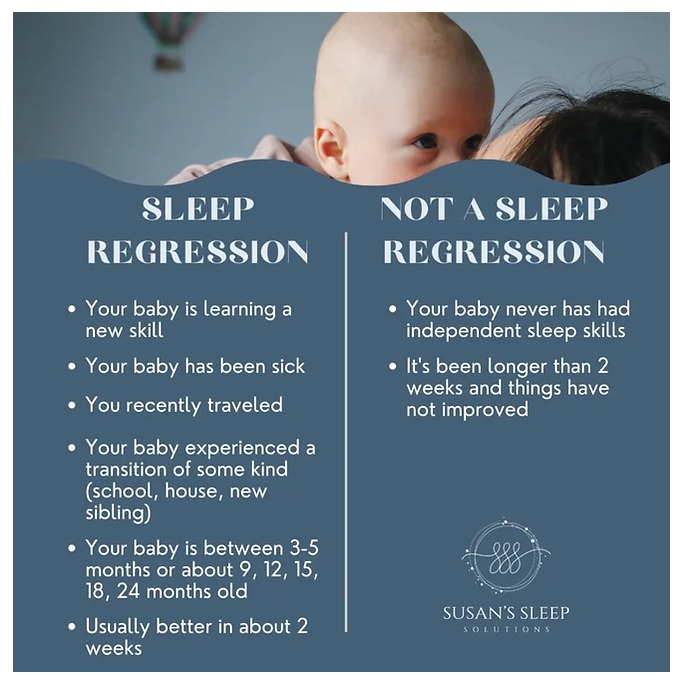
Is it, or is it not, a regression?
By Susan Lattuca, Susan’s Sleep Solutions

I remember when I first heard of a “sleep regression.” My first born, who was a relatively good sleeper until 6 months old, began refusing sleep. Everyone said “Oh, it’s the 6 month regression!” Things did not improve and when she was 7 months, it became “Oh, it’s the 7th month regression!” This continued on until she was 26 months old. Yes, TWENTY SIX MONTHS - over 2 years old. Ugh, if I knew then what I know now!!
Whenever I talked about my daughter’s terrible sleeping (up every hour to nurse, only napped in the car, unpredictable schedule), everyone said the same thing, “Regression!”
Regressions are REAL, they do in fact happen. But they are not continuous for months at a time. As a consultant, I have been trained to spot the difference between a true sleep regression and when it might not be a regression.
So the question on your mind is, “Well, what then IS a regression?” Let’s dig in!
What is a Regression and what causes it?
The definition of regression is to return to a former or less developed state. So when we are talking about a sleep regression we are talking about kids who usually have good sleep skills and then suddenly they don’t (if your child has NEVER had good sleep skills, it is not a regression. We will get to that). This usually looks like a baby who has been sleeping through the night for quite some time and then suddenly wakes up often throughout the night. Or a baby who had been a rock star napper and now is refusing naps. This obviously leads to confusion on the parent’s part – how are you supposed to handle this?
“Regression (noun): a return to a former or less developed state”
If what your child is experiencing is a true regression it is actually a good thing because it demonstrates your child’s cognitive growth! When babies and young children learn new things, their brain goes through a system or organization and this organization happens when they sleep (I could go into specifics because it really is cool, but I’ll hold that for another time). So as their brain works to synthesize, organize, and process the new information or skill, it can cause some bumps when this happens…which is, of course, during sleep. Luckily, this process doesn’t take too long, typically about 2 weeks.
Other causes for regressions are illness, teething, a big life change, and travel. All of these things throw off a child’s routine via disruptions and can cause ripples in their otherwise perfect sleep.

Other Considerations
Sometimes a regression is a clue that something is off and perhaps your child has new and different needs. For example, signs of dropping a nap often look like signs of aregression. But rather than being a regression, your baby is just telling you their sleep needs have shifted and they are calling for a response. I recommend not changing anything for about 2 weeks before making any changes in schedules. Tracking your child’s sleep will help identify whether or not a nap transition is the underling cause (typically this is around 6/7 months, 13/14 months, and around 3.5 years old).
You'll also want to double check your environment, especially when the seasons change and consider room temp and your chid's sleep wear.
Signs of a Regression
Usual signs of a regression include:
Early morning wakes
Shorter (and sometimes longer) naps than usual
Nap refusals
Taking a long time to fall asleep
Age: 6, 9, 12, 15, 18, 24 months are big developmental ages that often lead to regressions

How to get through a regression
The best thing to do to get through a regression is to not change anything. Keep doing what you had been doing before the challenges started. It very well may not be easy, but keep consistent – more change usually leads to more challenges which often leads to new bad habits out of desperation and necessity and then you’re really in a hole.
Keep to your regular schedule and response pattern that you have established with your child. Consistency and regularity makes them feel safe and secure and now is definitely a time to keep that up!
And, remember, a regression is temporary – about 2 weeks, sometimes shorter and not usually longer. Keep going!
Look for Patterns
First and foremost, when dealing with sleep, you want to look for patterns. So I always recommend keeping track of your baby’s sleep (FREE Sleep Log HERE). It doesn’t have to be on a fancy app, just pen and paper will do, but track down to the minute when you put them in the crib, when they fall asleep, and all wakings. This will help you begin to see what is really going on.
When it is not a regression?
Remember the regression definition? The definition itself makes it clear that you have to have an established good sleeper. So if your baby has never been a good sleeper, or perhaps they have had short periods of good sleep, what you are up against is likely not a regression. My guess is that they don’t know how to sleep independently and they are relying on something external to get to sleep.
Typical examples are babies who NEED to be rocked or fed to sleep. These babies (both of my girls were fed to sleep babies!) don’t know how to fall asleep on their own so when they wake up (as we all do over night), they can’t get back to sleep without their sleep prop. This is true for toddlers and big kids too – if your child requires you to lay with them to fall asleep, they have a sleep association that needs to be separated.
The solution here, regardless of age, is to sleep train which is the process that teaches your child how to fall asleep on their own and stop relying on a sleep association. While this is certainly more involved than just waiting 2 weeks for a regression to pass, this skill is one of the most important skills your child will learn in their entire life. Certainly worth the investment.

Conclusion
Regressions can majorly suck. Especially if you have put in the time, effort, and, often, finances to get your child to be a great sleeper. Luckily, if your child is a good sleeper, you can generally assume things will improve in a few weeks.
But if you have been struggling with your child’s sleep for a while now and you are not sure what to do, let’s chat. We can have most sleep challenges solved within 2-3 weeks!
By Susan Lattuca, Susan’s Sleep Solutions
